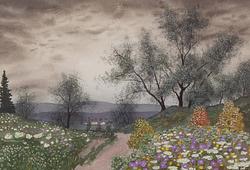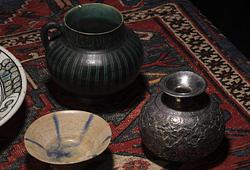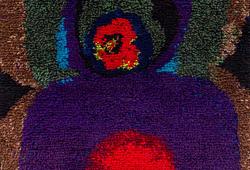Staffan Hallström
"Ingens hundar" (Nobody's dogs)
Signed SH. Panel 76 x 100 cm.
Exhibitions
Crane Kalman Gallery, London, April 1963.
Other versions of "Ingens hundar" are in the collections of Moderna Museet, Stockholm, Norrköpings Konstmuseum and Gävle Konstmuseum.
More information
Staffan Hallström stod med sitt måleri på en stark expressiv grund. Hans målningar växte fram delvis ur själva materialet men också ur hans djupaste känsloliv. Motiven tog form, sakta och ganska omständigt. Han ändrade, skissade nytt och målade över för att till slut finna en komposition och färgställning som innehade den balans och det uttryck han sökte. Hallström hämtade impulser från Delacroix, Rubens, Goya och Hills sjukdomsteckningar. Det finns också ett drag av Giacomettis tecknande av figurer och i skildringen av starka känslolägen.
I Hallströms konst är tecknandet viktigt och hans målningar utstrålar lika mycket linjeföring som målerisk poesi. För konstnären var omtagningarna viktiga för slutresultatet och det faktum att skaparprocessen tillåts leva kvar i det färdiga verket gör att hans målningar fortfarande känns väldigt närvarande.
Den första versionen av ”Ingens hundar” kom 1953. Det finns ett mänskligt drag över dessa hundar som har grupperat sig som om de skyddar varandra mot omvärlden. Högresta och alerta höjer de blicken och sina huvuden mot omgivningen och de vädrar lika mycket fara som morgonluft. I denna spänning av motpoler finner vi syntesen av Hallströms måleri.
Stig Johansson skriver i sin bok om Staffan Hallström, ”de idéer och känslostämningar som drev fram ”Ingens hundar” gjorde dessa målningar till något av de originellaste i svensk konst. Hans motivkretsar och bildidéer förblir så unika att de knappast kunde liknas vid något annat”.
Designer
Stephan Hallström supported his painting style with a strong expressive foundation. His paintings arose partly through its materials, but also through his inner psyche. The motifs took shape slowly and rather painstakingly. He revised, sketched anew, and painted over until he finally found a composition and color scheme that had the balance and expression he was seeking. Hallström drew inspiration from Delacroix, Rubens, Goya, and Hill's disease drawings. There is also a trace of Giacometti's drawing of figures and the depiction of intense emotional states.
In Hallströms art the sketching process is very important and his paintings radiate as much line work as painterly poetry. For the artist, revisions were crucial to the final result, and the fact that the creative process is allowed to remain in the finished work makes his paintings still feel very present.
The first version of "Ingens hundar" came in 1953. The artist personifies the dogs which have grouped themselves to protect each other from the greater world. Tall and alert, the dogs raise their gaze to their surroundings and they sniff as much danger as fresh morning air. In this tension of opposites, we find the synthesis of Hallström's painting.
Stig Johansson writes in his book about Staffan Hallström "The ideas and emotional states that drove the creation of "Ingens hundar" made these paintings some of the most original in Swedish art. His motifs and visual concepts remain so unique that they can hardly be compared to anything else."
Read more

























